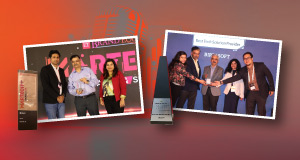Welcome to an episode of Tech Lyceum, a podcast from Birlasoft. My name is Neerja, and I am back with a very interesting topic. It is AI driven business performance across the manufacturing organization. That's what we're going to get into today with two experts. Let me tell you a little bit about them. We've got Karthik Palanisamy, AVP client partner manufacturing. Now Karthik is a veteran business and IT leader with 30 plus years in global team management and data strategy. He advises C level leaders on aligning Tech with business goals and delivers impactful solutions like faster product launches. Karthik is also a dedicated knowledge sharer in the industry, and we are thrilled to have him. Karthik, thank you for being here, and welcome to the show.

No, thank you for having me on the show. Appreciate it,
And joining Karthik in this conversation is Ravi Gunturu, Chief Architect data and analytics business unit with more than 30 years of rich experience in analytics, digital strategy, Big Data Management, cloud transformation, programs, systems thinking approach and the like Ravi has successfully led global teams in numerous analytics projects driving accelerated business outcomes for organizations. Ravi, a pleasure to have you. Thank you for joining us.
Oh, thank you for having me today. Neerja,
Let's get down to business, gentlemen. My first question is for you. Karthik,
Q: What are some recent challenges manufacturing organizations are facing currently, and how can these challenges be effectively addressed?
Yeah, that's an interesting question. You know, from a manufacturing company side, and I think it's true for a lot of other companies as well, but from manufacturing company side, in recent years, they have faced a lot of challenges, especially during the pandemic and now with the geopolitical events on one end and the technological advances on the other. This has further been exasperated the situation one end of the spectrum, you can see that there are global supply chain issues leading to delays and shortages. There is supplier reliability, which has been impacted because of that. There are transportation bottlenecks and other logistic challenges as well come, which comes with that, there is obviously inflationary pressures, which have been, you know, contributing to rising costs, but there's also now potential rising concerns with the geopolitical environment, again, on Tariffs and Trade barriers, which are all impacting companies operations and their business decisions. On the other end, the advancements in technology like AI, automation, IoT, etc, they have at least enabled a path forward for companies to leverage in solving some of these challenges. But as you would imagine, they also come with their own set of challenges. You know, the implementing and adopting of these technology can be complex and sometimes expensive. Now they have also given rise to concerns around cybersecurity and data privacy, and with that comes the evolving regulations to comply with, which also can be challenging and expensive. That's why it's kind of critical for companies to have a strategy and plan to address these challenges. As an example, having accurate and timely supply chain visibility. You know, strategies to mitigate some of the supply chain disruption with supplier diversification or near or reshoring, as they call it, of manufacturing operations, to reduce lead time. As an example, embarking on digital transformation, to leverage some of those new technology capabilities to not only improve efficiency and reduce costs, but also to enable an innovation or a mindset of innovation, to always be looking around the corner as they face these challenges head
on. Yeah. Thanks, Karthik, for taking us through that. And you did mention AI is easing some of these challenges. Ravi, if I could ask you this question,
Q: Could you explain how exactly AI is being utilized currently in the manufacturing sector? What are some of the most significant advancements in AI that have impacted manufacturing in recent years?
Thank you. Neerja, AI is currently being utilized in the manufacturing sector to enhance efficiency, precision and accuracy across various manufacturing processes at reduced costs. So manufacturing, for the most part, adopts a repeatable process that generates identical products and components, which results in huge amount of data with the advancements in computing, low cost computational techniques, high speed data processing and better frameworks manufacturing are able to derive insights from data across the value chain, from. Market demand forecasting to engineering, procurement, factory automation, warehousing, logistics and aftercare service. Some of the applications where AI has real success stories are in predictive maintenance systems, where AI models analyze real time data from sensors and equipment's to identify patterns, including potential failures. It's used across the quality control and inspection systems using some of the modern techniques on adopting computer vision, machine learning, defect detection, etc. It's also used in supply chain optimization, in improving the demand forecasting, inventory management. Other areas where we have seen working with our clients and see real benefits are in terms of Intelligent Automation, whether we are looking at in terms of the overall equipment effectiveness, reducing cycle times and saving costs, or in terms of manufacturing design and optimization, where new design possibilities are being looked into, or even In in the aftercare service, where some of the new capabilities, using the digital threads are helping our clients in improving the efficiencies at a very reduced cost.
Thanks, Ravi. And before we, you know, take the ball back to Karthik side of the court, I do have one more question along the same lines, how has AI driven technology improved overall business performance in manufacturing organizations from what you've seen.
Q: Could you share specific examples where you know AI has led to measurable improvements in efficiency or productivity?
Yeah. So AI technology has, uh, improved more all business performance, especially with reference to enhancing the operational efficiency, the automation of repeatable tasks. And as more and more data is being brought in, into the into the system, there is an opportunity to run the AI algorithms and better processes to identify the patterns and to understand the repetitive capabilities, thus facilitating adoption of more automation also helps in terms of predictive maintenance, improved quality control, cost reduction, optimizing resources and enhanced decision making,
Right, Karthik, my final question is for you,
Q: If you could also address how manufacturing organizations should prepare for these upcoming changes, you know, given everything we've discussed today.
Yeah, actually, there are a lot of ways organizations can prepare and, you know, taking a segway from what Ravi was talking about, right? And also coming from a data background, I feel data driven decision making is even more imperative than before. The accuracy, the timeliness and availability of data and to be able to harness its insights across all data points in the organization and in real time are absolutely critical. So I think that's going to be gold, leveraging automation and other technology advancements and enabling the workforce to adopt these technologies are also going to go hand in hand technologies and process, which not only improve efficiencies, but also enable the company to be more agile and have speed to market for changing consumer or customer needs, and having a clear road map and plan for digital transformation is going to be key. Companies should also invest in and pay special attention to change management, as we all know right that it always gets left behind and train as workforce to be nimble and identifying and adopting to the changing market conditions and needs, regular and consistent upskilling or resourcing of these skills should also be planned. Organizations should look at the process and maybe move to lean manufacturing. They should look at, you know, optimizing their supply chain to take cost out where possible and also gain efficiency. And they should look at optimizing the pricing and make it more dynamic, as an example again, and improve the bottom line. You know, in the past, lot of these have been looked at almost like a nice to have, or sometime optimized, partly to solve for a point in time. Need, you know, by the companies. But now this is how they will need to be looking at manufacturing, and they'll have to, you know, if they want to stay profitable in the current market conditions.
Thank you, Karthik and Ravi, I think what's been helpful, and I'm sure everyone listening in would agree, is how clearly you've articulated your thoughts on the subject. And what would help also is if you could share a few takeaways as we wrap up this episode for the listeners. What would those few lines be? Ravi, let me start with you on this one.
Thank you. Neerja, so with the world moving towards industry X point zero, it is more imperative for our clients to focus more on smart manufacturing techniques and capabilities, and that's an area where AI and the associated technologies related to IoT robotics, are helping shape up the industry, and modern techniques really are driving the accelerated growth for the manufacturers,
Okay, and Kartik, your closing thoughts on this?
Yeah, you know one thing I always like to say, there is not a one size fits all solution, so it has to be tailored towards your company's business goals, right? And we can definitely help formulate a strategy and come up with that road map. So you know, please feel free to reach out via email or call if you would like more information or get into more details on the topics that we touched on, we would be happy to help.
Absolutely. That's a nice way to sign off. You can reach out to the team to learn more about this. Karthik Palanisamy, thank you so much for allowing us to share in your knowledge. It was great having you on the show.
No thank you for having us here.
That's a wrap on today's episode of Tech lyceum. Thank you for joining us and pressing play on this episode. We will be back with a lot more right here. So stay tuned until next time. It's me, Neerja, signing off.




